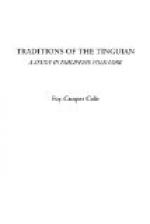In the old time, a man went with others to get heads. They were gone very, very long, and the man’s daughter, who was little when he went away, was grown up and beautiful when he returned. When he got to the gate of the town, his daughter went to hold the ladder for him to come in. [375] The man did not recognize his daughter, and when he saw her holding the ladder for him, he threw his arms around the ladder and seized and kissed her. The girl was very sorrowful because her father had not recognized her and had misunderstood her intentions; so she went home and said to her mother, “It is better now that I become a coconut tree, to stand close by our house.” In the morning the man and his wife missed the girl, and when they looked out doors, there stood a fine coconut tree close to the house; so they knew that she had changed to the tree.
75
In the old times there were two flying snakes in the gap of the Abra river. [376] Many men had been killed by them. So the head man of Abra invited Malona and Biwag, two very brave men from Cagayan, to come and help him kill the snakes. They came at once with big bolos, shields, and the trunk of the banana tree, which they used to fight with. When they arrived, they were taken to the gap, and the snakes attacked them. The men fought with the trunk of the banana tree, and the wings of the snakes stuck to the trunk; so they killed them easily. When they had killed them, they came back to the leader and showed him, and he asked what should be their pay. They did not ask any reward, but the leader gave them gold in the form of deer and horses. Then they went home, and after that the people of Abra could pass through the gap.
76
Hundreds of years ago there were two people who were husband and wife. Their names were Tagapen and Giaben, and they had only one son whose name was Soliben. Those people came from Ilocos Norte; they came down to Vigan to pass a while, then came into the Abra river. When they were in Banoang, they sailed on a raft in the Abra river to come up to Langiden. When they reached that town, they stopped there to stay a short time, because Tagapen went to the town to give thoughts to the people there and to give a nice face to the girls. When Tagapen was in the town, in Langiden, his son Soliben was weeping on the raft by his mother. “Sleep, sleep, sleep, my dear son, because your father is not here yet; it-to-tes, it-to-tes, so sleep my son, do not weep,” said his mother, whose name is Giaben. When Tagapen came back from the town of Langiden, they began to sail again until they came to Pidigan. When they reached the town of Pidigan, they stopped there because Tagapen went to the town to give a nice face to the ladies and girls. Then his son wept again, “Oh, dear son, sleep, sleep, sleep; oh, dear son, sleep, sleep, sleep, for your father is not here yet. When he comes back, he will get bananas for you to eat. It-to-tes, it-to-tes,




